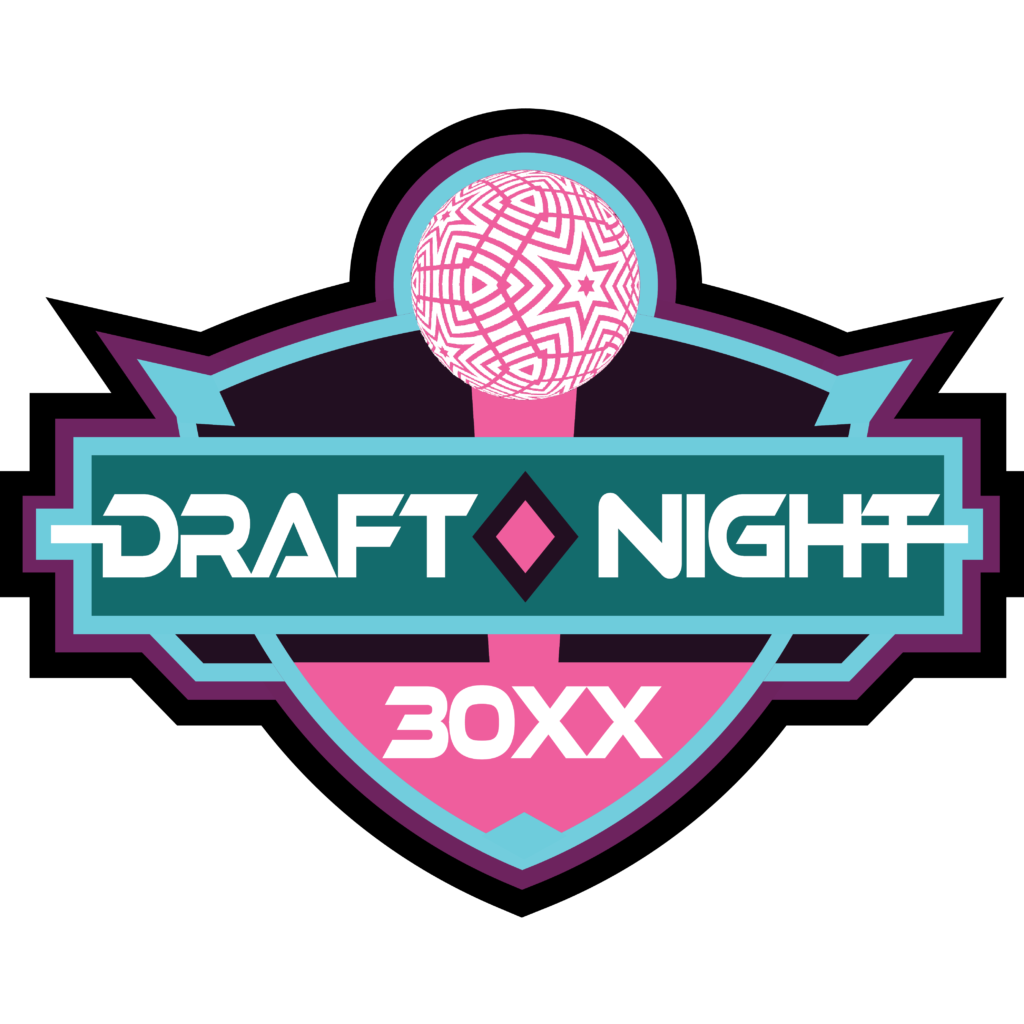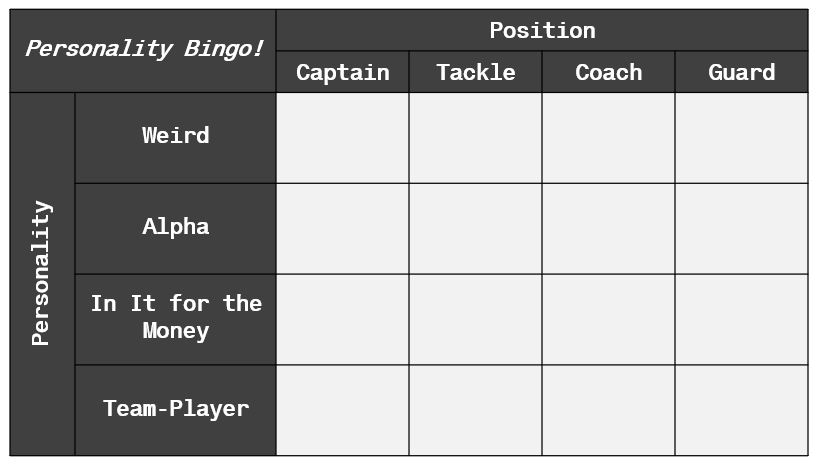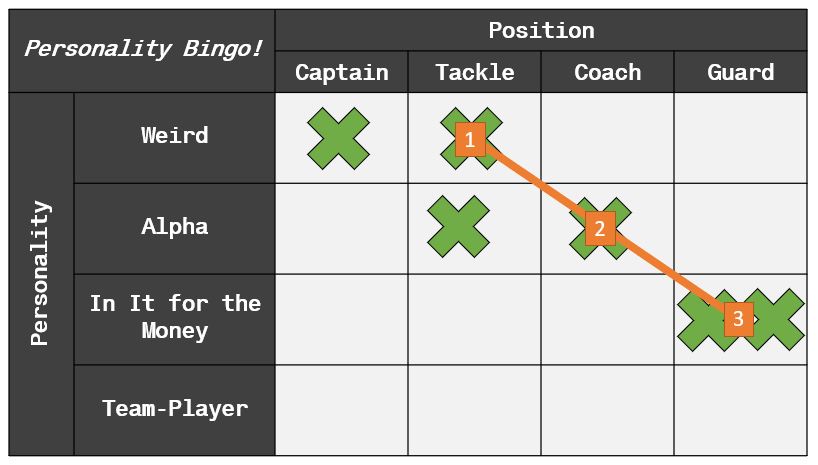
GM Brief
If you’re looking for the general game overview, click here. The secret goals of GMs in Draft Night 30XX will be posted on the private #GM-chat channel on the Discord.
General Managers (GMs) handle the day-to-day operations of Franchise but are critically involved with the hiring and firing of high-level personnel. During the draft, they choose which athletes to draft, and coaches to hire. GMs are the most senior members of the Franchise “on the ground” and are widely praised or blamed for the success or failure of their team. It’s not easy balancing the ego-driven whims of the Franchise Owners the data-driven obsessions of the head Saber, and whatever the easily distracted Vice Presidents are focusing on today.
Morning Affirmations
By: Anwar Lapointe
I advise the Top.
I guide the Ship.
I am the Calm in the Hurricane.
Hate flows ’round me. No matter.
I am the decider.
Inducted Hall of Fame General Manager, Anwar Lapointe, is more known for leading the Toronto Great Lakers to a perfect season than he is for his “poetry”. None the less, League fanatics around the globe recite his creed before job interviews at the local caffeine-shot joint.
GM's Authority
The GM is the person who chooses which athletes to draft each round, although they are expected to heed the council of the rest of the Franchise’s upper management. All trades which involve the trading of athletes, draft slots, or coaches needs the approval of the franchise’s GM.
The GM is directly hired by the Owner and is (on paper) in charge of the franchise’s Saber and Vice Presidents. It is expected that the GM defer to the Owner’s wishes and keep the Saber and Vice Presidents from stirring up too much trouble. It’s also expected that the GM stand up to the Owner when they’re doing something crazy or selfish with their money instead of investing it into the franchise! Balancing relations can be a balancing act.
Last, while it is technically the Owner’s responsibility to ensure the team’s budget is sound, Owners are often too busy to design a budget. It may fall on the shoulders of the GM to ensure an accurate and productive budget gets submitted on time. Frequently, Vice Presidents are tapped to handle this.
The Draft
GMs make the final call as to which players to draft when. Franchises will be notified when their draft slot opens up. It’s at that point when they can draft any athlete still available by using the “!draft” command followed by the jersey number of the athlete. Here are some examples that would work:
- !draft 3
- !DRAFT 33
- !Draft 120
- Each team will receive one draft slot (‘pick’) per draft round.
- Once an athlete is drafted, they are locked in until traded. Drafted athletes cannot be dropped for a team’s roster or exchanged for athletes in the draft pool – even after the last draft pick has been made.
- The first two draft rounds will have 5-min. draft round slots, the last three will have 4-min. draft slots.
- If a team does not draft a player during their intended time slot, they can draft any athlete at any point following. In other words, draft slots represent the earliest possible time a franchise can draft an athlete.
- Draft picks will be adjudicated in order which they are received by the computer.
- Draft slots can be traded between teams (with GM’s permission).
- We’ll be using a software to automate the Draft. If you’re experiencing technical difficulties, you can declare you’re going to draft an athlete in your team chat and tag the League Supercomputers (‘@Supercomputer’). Assuming everything is in order, the moderators will manually update the back-end data.
- Pro-tip: Due to the rationing of computing power, early draft slots are not as valuable as in other sports because Sabers need time to compute their fancy models and estimate player performance.
Rivalries
While Owners frequently view their franchise’s rivalry as a contractual obligation or a “money-printing machine fueled by the petty rage of small-minded fans” as one anonymous Owner is quoted, GMs take it as a point of pride to beat their League rivals. After all, it’s the GMs that actually make the local press appearances and have to hold their head high at the local steakhouses and charity functions.
Only one team can be the World Champion, but it doesn’t take a world championship team to completely embarrass your rivals on the field.
Each franchise will have one rivalry within your division and one rivalry outside your division. You will play your divisional rival twice and your inter-divisional rival once.
The Budget
The Budget is a thorough document detailing you financial priorities for the upcoming season. You’ll have to discuss the team as a whole as to where your money best resides.
The soft deadline for franchises to turn in their budget soft 12am midnight of the day of the game, although many franchises finish and submit their budget during or shortly after the conclusion of the Draft. Separately, the budget is also where the GM would input what playstyle they’ll be orienting their team for, for the upcoming season.
Each line item in the Budget has an explanation of the effect of funding that line item – which generally relate to either financial profits post-season or improving the performance of the team during the season. The individual effects of each line-item are not elaborated on here.
Hiring, Firing, Trading, and Managing
The rest of your job relates to managing people and personalities.
It’s important to note that while GMs are at the top of the totem pole, they are expected to cooperate and delegate responsibilities to the Saber and Vice Presidents as well as work closely with the Owner. In other words, don’t hog all the fun!
Coaches are a critical part of the team and managing personalities of that can give your team just the edge it this season!
Coaches & Playstyles
In addition to athletes, GMs are also responsible for the acquisition of a head coach. Coaches vary in quality and cost. Each coach has a several public and private stats. The coach’s private stats aren’t known by anyone except for the highest bidder for that coach (see Bidding for Coaches below).
| Public Coach Stats | Private Coach Stats |
|---|---|
|
|
Favored Playstyles represent what strategies and tactics the coach will pursue throughout the season. At the end of Draft Night, the GM will have to choose which one of the Coach’s favored playstyles to utilize. Notably, while the athlete performance remains constant throughout the League season, the bonus from team playstyle varies based on your opponent. In the current meta of the sport, there are four playstyles, listed here with the benefits granted from each strategy:
- Aggressive – +2 performance per player with aggressive playstyle, +4 performance instead per player with aggressive playstyle when team is playing against an innovative team.
- Innovative – +2 performance per player with innovative playstyle, +4 performance instead per player with innovative playstyle when team is playing against a defensive team.
- Defensive – +2 performance per player with defensive playstyle, +4 performance instead per player with defensive playstyle when team is playing against an aggressive team.
- Synergistic – +1 performance per player with synergistic playstyle.
Bidding for Coaches
Coaches hail to the highest bidder. Coach bidding is handled by the Supercomputer and automatically adjudicated each Draft Round.
To bid on a coach, use the command !bid [amount (in integer)] [coach name]. For example, to bid 8 zillion cash on Coach Prince, the appropriate input would be !bid 8 prince.
The Coach Bidding process:
- During each Draft Round, franchise GMs will privately bid money to secure Coaches for their franchise.
- Only one bid may be active at a time. New bids overwrite old bids.
- Bids must be at minimum equal to the coaches’ Salary stat.
- At the end of the first Draft Round, the highest bidders for each Coach are cataloged.
- The highest bidder’s franchise receives the private information on that coach (Performance and Favored Playstyle #2).
- The coach’s highest bidder and their new salary is made public.
- Lower bids than the highest are not published.
- The process then repeats in subsequent Draft Rounds.
- Coaches with existing agreements with Franchises can be outbid by other franchises in subsequent draft rounds. As a result, coaches may move from franchise to franchise throughout the game.
- This repeats until Draft Round 4.
- At a randomly-decided point in time during Draft Round 4 (the second to last Draft Round), Coach Bids will be adjudicated again and locked.
- The highest bids will be cataloged and made public (as done at the end of previous Draft Rounds).
- The Coaches with active bids become locked can no longer be fired, traded, bid upon, or otherwise exchanged between franchises or the open market.
- The remaining Coaches can only be bid on by the team’s with no Coach.
- Secret bidding will proceed for the remaining coaches with the remaining franchises at a faster time-frame, adjudicated manually and directly overseen by the League Supercomputer (moderators).
Coach Bidding Errata
- If a franchise is currently the highest bidder on a coach, that franchise can still bid on other coaches. If a franchise with an existing agreement with a coach wins another bid for a different coach, their current coach is automatically dropped and the new coach is automatically acquired.
- If a coach which had an active bid gets dropped, their Salary stat (i.e. how much money they want) will go down overtime, but not decrease to lower than what their starting salary demands were.
- Franchises may manually drop their coach by letting the League Supercomputer (moderators) know.
Managing Personalities
Internal franchise harmony is not guaranteed throughout Draft Night. Oftentimes the franchise’s Sabers and Vice Presidents can be uppity, and the Owners, callous and money-grubbing. It will be up to you to ensure everyone keeps the franchises best interests at heart in their affairs throughout Draft Night.
Managing Down. Vice Presidents want to be respected as much as the Sabers and the Sabers as much as the GMs – these feelings manifest in their desires for a bonus (see Budget). Quibbling over bonuses can completely derail the draft process and led some of your team to go “off the reservation”. Avoid this by every appropriate means and remind the Sabers and VPs that the bonuses only trigger if the franchise has a winning season, which should encourage them to do their job. Their normal salaries are far more than enough to live on anyway.
Managing Up. The Owners generally only want to make money. They’d like to win, but making money is priority #1 for them. In order to cajole money out of their pockets, the Owner needs to feel that a winning season is possible, and profitable. If winning is neither possible or profitable, you may need to make the mature decision to structure the budget of the season in anticipation of a “rebuilding year”. It may be difficult, but there’s always next year.
Personalities on-the-field (of athletes and the coach) can also have a large effect on ultimate performance of your team.
Personalities Bingo
As all good General Managers know, the most challenging part of managing people is managing personalities. Luckily, extensive research into the personality makeup of successful teams have shown that the most successful teams are made up of individuals which are either all the same or all different.
Every GM will receive a non-identical personality bingo card, looking something like the one shown to the right. These cards will be procedurally generated to ensure balance between bingo cards.

At the end of the game, the bingo card will be filled in based on the personality (row) of each athlete for each position (column). The Coach and their personality is also on the card.
The number of filled in boxes in a straight line (either in a row or diagonally) will be counted. Teams then receive a bonus based on the number of boxes are aligned. If there are multiple different lines of boxes filled in, only the longest string of filled-in boxes is counted.
- 2 boxes = +4 team performance
- 3 boxes = +9 team performance
- 4 boxes = +14 team performance
Personality Bingo Example
The Washington Senators have the following team:
One weird Captain
One weird Tackle
One alpha Tackle
One alpha Coach
& two Guards who are both in it for the money
After filling in their Personality Bingo card (see right), their longest string of diagonal or horizontally adjacent filled boxes in a straight line is 3. The Washington Senators receive a +9 team performance bonus.

Other
Pre-game Checklist
- Draft Night 30XX Introduction & Overview
- Draft Night 30XX GM Brief (This document)
- GM Goals (Distributed privately via #GM-chat Discord channel)
- Team Briefs (Distributed privately via team-specific chats
- Bookmark this webpage which has useful game links!
